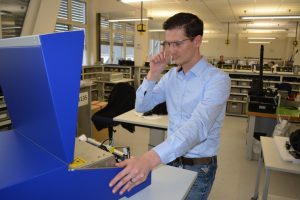Google Glass test trial is carried out within the Austrian industry sector
By the end of 2013 the Google Glass explorer edition was rolled out to software developers. By now an application developed by evolaris is already being tested within real industrial operation processes.
Graz. That Google’s smart glass does not just suit the consumer section but also the industrial sector is right now being tested within a research project carried out by AVL List GmbH in cooperation with evolaris, a competence centre for mobile innovation. In the course of the project researchers want to find out to which extent Google Glass is suitable for complementing the current AVL system documentation and how service staff can be supported in performing maintenance tasks.
Technical features of Google Glass
Google Glass is equipped with a see-through display in which visual content such as pictures, videos and textual information is displayed in the form of so-called timecards. Through an integrated camera pictures and videos can be recorded and QR codes can be scanned. The integrated acoustic system enables users to receive audio information as well as to make phone and video calls and to control Google Glass via voice command.
Service instructions via mini display
The key advantage of using Google Glass in the course of maintenance tasks arises from the possibility of providing supportive information within the integrated mini display and therefore both hands of the service operator remain free – compared to conventional smartphones or tablets. In order to ensure the provision of relevant information, specific QR codes are fitted to the respective machine. The service operator can scan the QR code using Google Glass and automatically receives appropriate information in the form of short video sequences and textual step-by-step instructions. Through touch interaction and voice control the service operator can switch back and forth between the single instruction steps. If required, operators can contact another expert or colleague using the video telephony application or record and save the maintenance tasks they perform to store the information for training purposes.
“By using Google Glass we now have the possibility to structure our system documentation in a user friendly and target group oriented way. The functionalities resulting from this current developments will support internal as well as external service operators in efficiently performing their tasks”, says Thomas Kern, project coordinator AVL List GmbH.
No new development without including the end user
Whenever evolaris starts to develop new applications the end user is engaged from an early stage. evolaris CEO Christian Kittl: “Innovations, especially within the technological field, only then have a realistic chance to be accepted and integrated into everyday human life when individuals see their personal benefit in them.”
evolaris employees working exclusively within the field of technology acceptance are accompanying the development of innovative applications using specific scientific methods in order to ensure the general acceptance towards the technology as well as to define appropriate and user friendly operating concepts. First user tests which have been conducted regarding the Google Glass application for AVL List were very promising. A comprehensive evaluation is planned to be carried out in the first half of the year.

